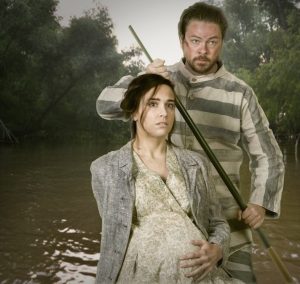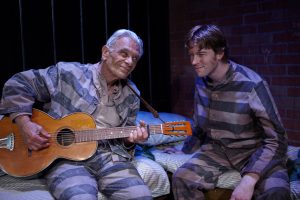No Good Deed Goes Unpunished in NCR’s Nice ‘Way Downriver’
Author William Faulkner didn’t much like his 1939 novel The Wild Palms, which is made up of two installments — he thought the latter half featured a stronger sense of social irony, so he published it by itself, calling it The Old Man.
In so doing, he underscored the story’s symbolism; the Old Man in question is the Mississippi River, which in 1927 was behaving anything but elderly. A spring flood on the lower banks would take 264 lives and touch ten states from Kansas to Arkansas; amid its $400 million in damages (5.3 billion in 2016 dollars), the event is still the most costly river flood in United States history.

Ellie and Aikins (Sara Fetgatter and Richard Baird) are two fish in a very, very large pond. Photos by Aaron Rumley.
Aikins is only 25, but the rigors of Deep South prison life (he’s a train robber incarcerated at Parchman State Penal Farm) have aged him well beyond his years. Ironically, and amid the calamities of the flood, he’s called to a task better suited to that younger man. He must, and does, rescue a pregnant woman stranded on a cotton mill roof; here’s his chance to dust himself off and hold himself out as the penitent he is, daring to speculate on a future of freedom amid his newfound altruism.
Ellie, the unmarried girl in distress, has her baby boy during the ordeal, with the trio evolving into something like an instant family -– but internal politics and racism make short work of the bond as the authorities slap another 10 years onto Aikins’ sentence amid his “escape.” Back to the block with him, wherein a monotonous life with cellmates Ike and Tommy picks up pretty much as usual.
Arguably, this isn’t the first or last time for such injustice, but it may be the only time the central character in a prison play is robbed of his own exposition. Morgan largely sets up our introduction to Aikins through questions from young Tommy, who practically salivates over his proximity to Aikins and Ike –- and his eagerness intrudes on our understanding of Aikins’ sense of self. We want to hear Aikins’ story from Aikins, not on the strength of questions from a subjective second party.

The Cajun (Geno Carr) obviously knows something about comic relief.
There’s lots more great acting where that came from, starting with the peripatetic Richard Baird’s excellent turn as Aikins. Baird, co-founder of San Diego’s New Fortune Theatre Company and late of stints in Oregon and Arizona, calls up the darker sides to his Shakespearean alter-egos as he subtly gives vent to Aikins’ better angels. Sara Fetgatter’s Ellie is equally savvy at the art of downplay, Fetgatter’s character wearing her beleagueredness for what it is. Benjamin Cole’s Tommy is bustin’ out all over with his giggly simpleton’s definition of celebrity; he could learn a lot about prison life from crusty Ike, but Morgan doesn’t exploit the subtextual bond.
Geno Carr’s harlequin Cajun has savoir faire down pat as he teaches Aikins how to skin alligators; and
Max Macke’s vapid Deputy Buckworth clearly got his job by default. (Listen to Buckworth’s accusation that he caught Tommy spankin’ it one day; Tommy’s denial is absolutely classic!)

Ike (Robert Grossman, left) and Tommy (Benjamin Cole) are generations apart except for one thing.
Before curtain, North Coast artistic director David Ellenstein, who also helmed this show, unveiled the facility’s new light bank. The state-of-the-art improvement was partially funded by a grant from the county – but the welcome new addition recalls the Great Recession, which seems to have scuttled the company’s plans for woefully needed expansion. There’s much, much more to this troupe’s enterprise than its plays; with Way Downriver, that sense is easily apparent.
This review is based on the opening-night performance of April 17. Way Downriver; William Faulkner’s Old Man runs through May 8 at North Coast Repertory Theatre, 927 Lomas Santa Fe Drive in Solana Beach. $43-$50. northcoastrep.org, 858-481-1055.
